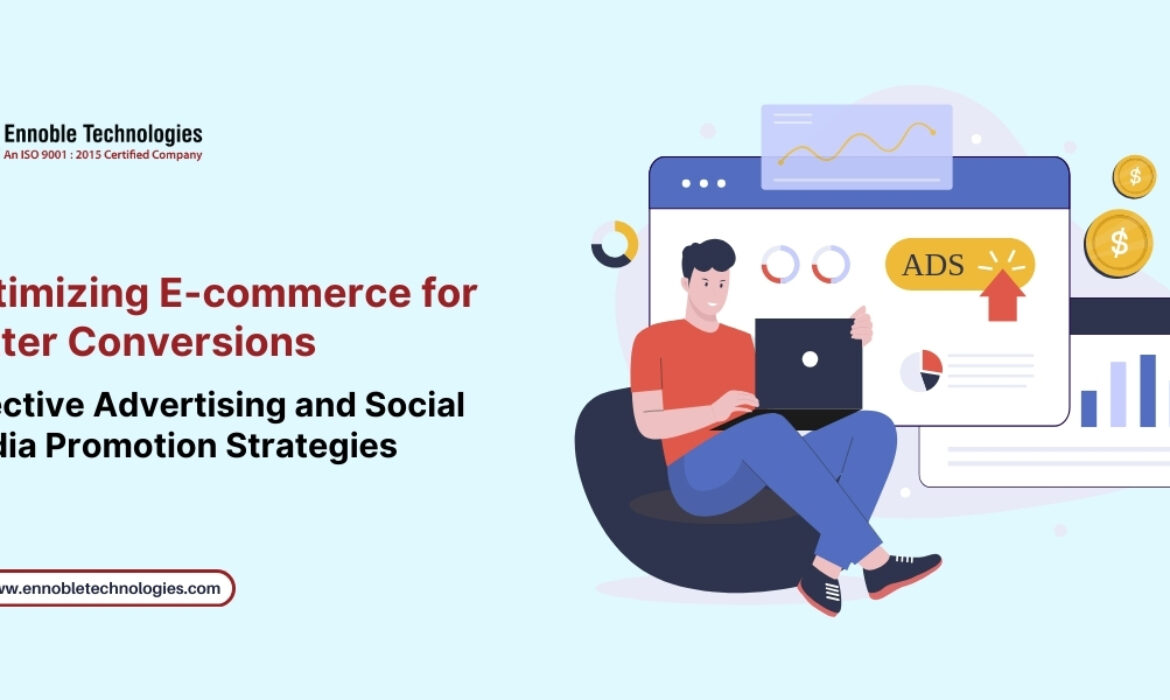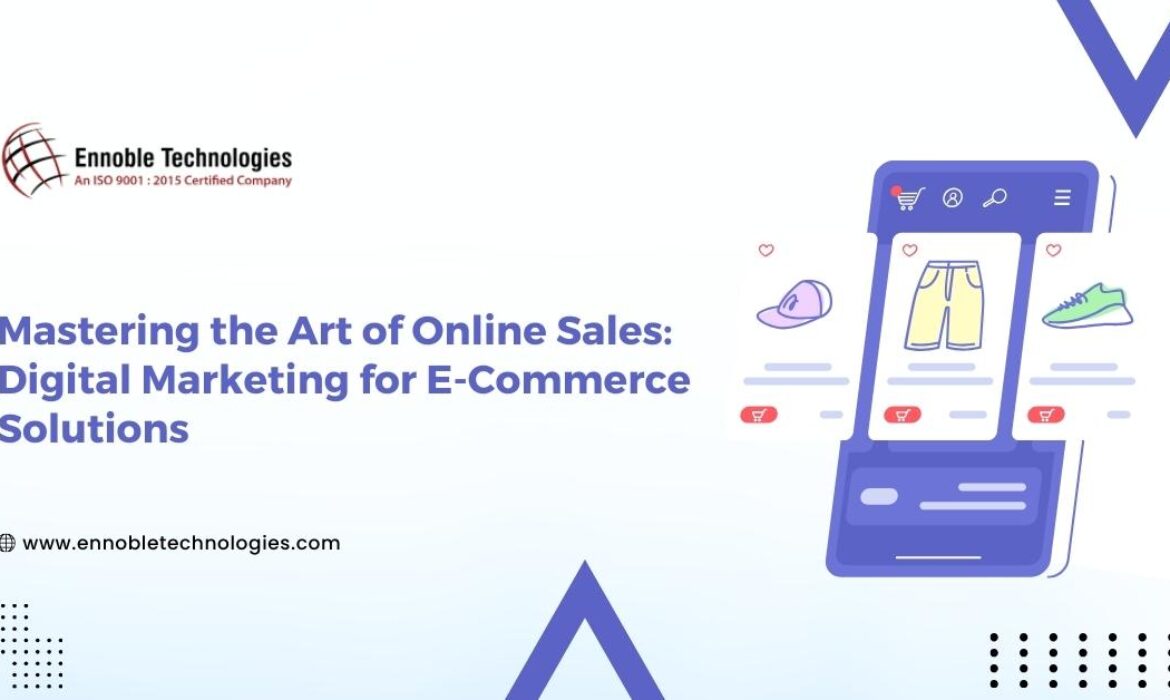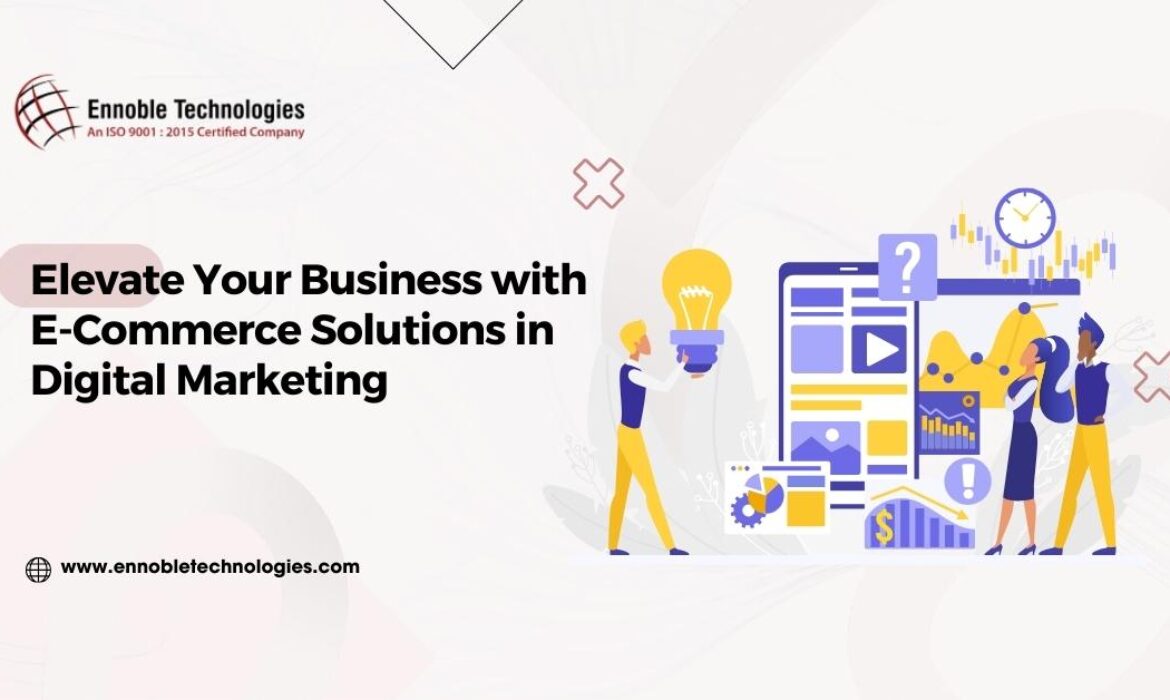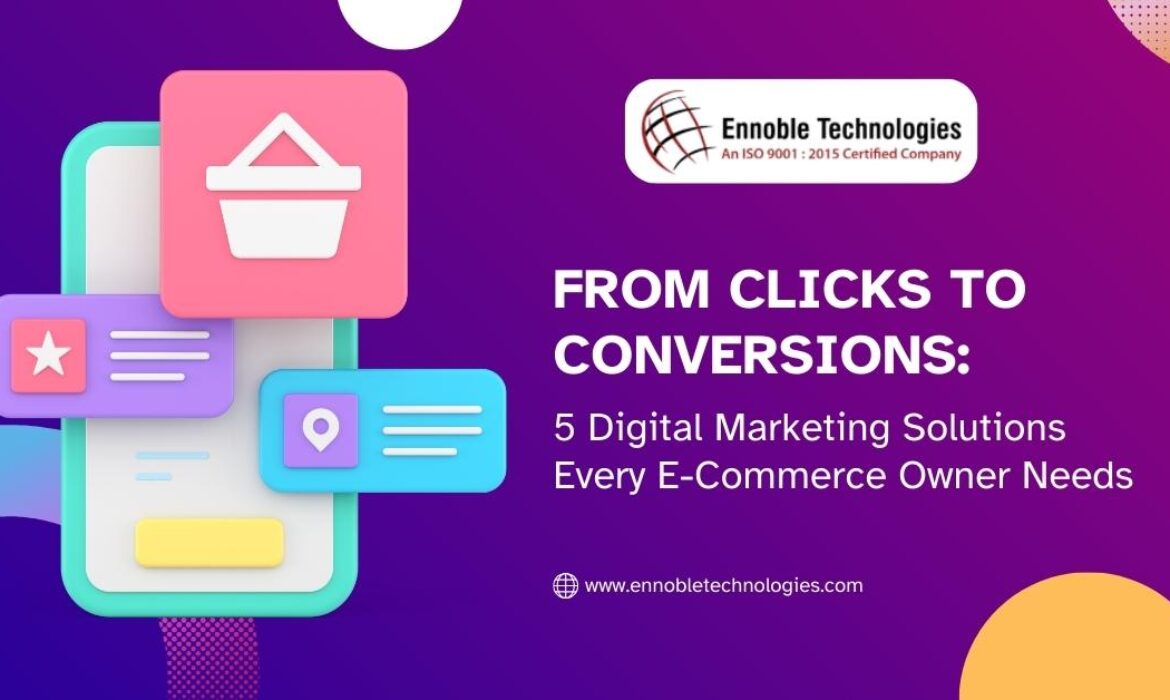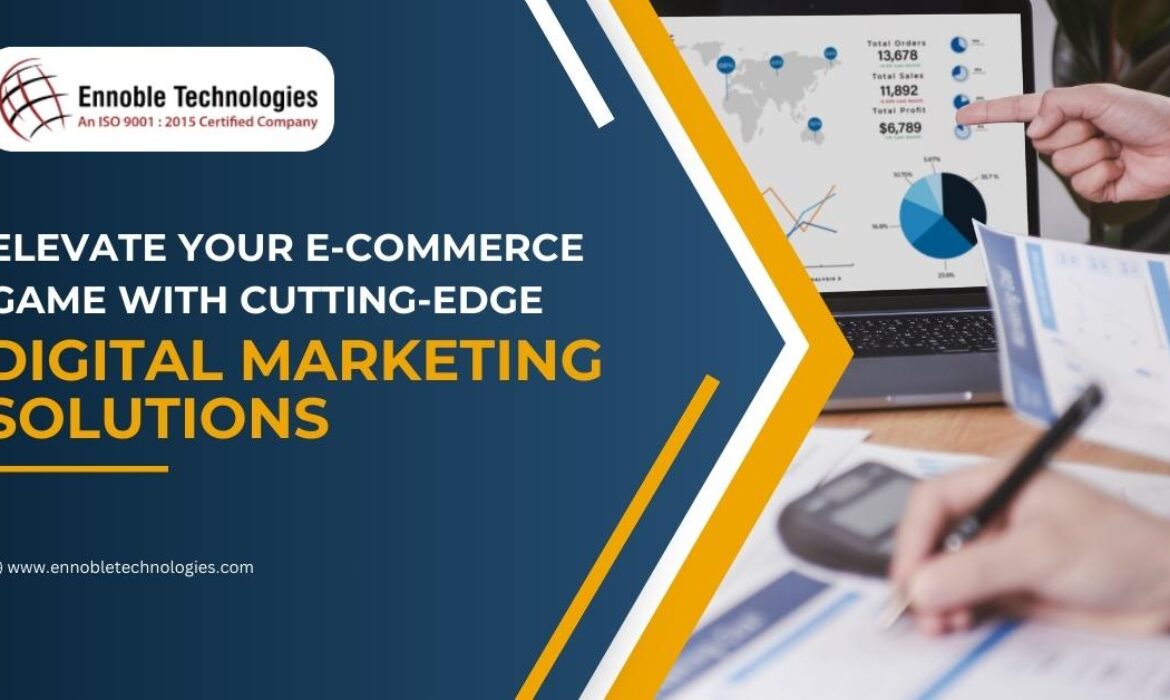Optimizing E-commerce for Better Conversions: Effective Advertising and Social Media Promotion Strategies
In the fast-paced world of e-commerce, businesses constantly strive to enhance their online presence and boost sales. Optimizing e-commerce for better conversions is essential for driving growth and ensuring long-term success. This comprehensive guide will delve into e-commerce conversion optimization, effective e-commerce advertising, and social media promotion strategies for e-commerce. We’ll explore various tactics and techniques to help you increase e-commerce sales and improve overall performance. And, of course, Ennoble Technologies will be highlighted as a key player in providing these invaluable services.
Understanding E-commerce Conversion Optimization
E-commerce conversion optimization is the process of improving your online store to increase the percentage of visitors who complete a desired action, such as making a purchase. Optimizing e-commerce for better conversions involves analyzing user behavior, identifying barriers to conversion, and implementing changes to enhance the user experience.
Key Tactics for E-commerce Conversion Optimization
- Improve Website Navigation: A well-structured and easy-to-navigate website is crucial for keeping visitors engaged. Simplify the menu structure, use clear headings, and provide a search bar to help users find products quickly.
- Optimize Product Pages: High-quality images, detailed product descriptions, and customer reviews can significantly influence purchasing decisions. Ensure your product pages are informative and visually appealing.
- Streamline Checkout Process: A complicated checkout process can lead to cart abandonment. Simplify the checkout process by minimizing the number of steps, offering guest checkout options, and providing multiple payment methods.
- Implement A/B Testing: A/B testing allows you to compare different versions of a webpage to see which one performs better. Test various elements such as headlines, images, and call-to-action buttons to identify the most effective combinations.
Effective E-commerce Advertising Techniques

Advertising is a powerful tool for driving traffic and increasing e-commerce sales. Effective e-commerce advertising involves using various platforms and techniques to reach your target audience and promote your products.
Types of E-commerce Advertising
- Pay-Per-Click (PPC) Advertising: PPC campaigns allow you to bid on keywords and display ads to users who search for those terms. This form of digital advertising for e-commerce is highly targeted and can deliver immediate results.
- Display Advertising: Display ads appear on websites within the Google Display Network. These ads can be in the form of banners, images, or videos, and they help increase brand visibility and attract potential customers.
- Social Media Advertising: Platforms like Facebook, Instagram, and Pinterest offer powerful advertising tools to reach a wide audience. Social media marketing for online stores involves creating engaging ads that resonate with your target demographic.
- Retargeting Ads: Retargeting ads are shown to users who have previously visited your website but did not make a purchase. These ads remind them of your products and encourage them to return and complete their purchase.
Best Practices for Effective E-commerce Advertising
- Target the Right Audience: Use demographic data, interests, and behavior to define your target audience. The more precise your targeting, the more effective your ads will be.
- Create Compelling Ad Copy: Your ad copy should be clear, concise, and persuasive. Highlight the unique selling points of your products and include a strong call to action.
- Use High-Quality Visuals: Eye-catching images and videos can significantly improve the performance of your ads. Ensure that your visuals are high quality and relevant to the products you’re promoting.
- Monitor and Adjust Campaigns: Regularly review the performance of your ad campaigns and make adjustments as needed. This could involve changing your targeting parameters, tweaking ad copy, or adjusting your budget.
Social Media Promotion Strategies for E-commerce
Social media is a powerful tool for promoting your e-commerce business and engaging with customers. Social media promotion strategies for e-commerce involve creating and sharing content that attracts and retains a loyal audience.

Key Social Media Promotion Strategies
- Create Engaging Content: Share a mix of content, including product highlights, behind-the-scenes glimpses, customer testimonials, and educational posts. Use high-quality images and videos to capture attention.
- Leverage Influencer Marketing: Partner with influencers in your niche to reach a broader audience. Influencers can help promote your products authentically and drive traffic to your online store.
- Run Social Media Contests and Giveaways: Contests and giveaways are effective ways to increase engagement and attract new followers. Encourage participants to share your content and tag friends to broaden your reach.
- Utilize Paid Social Media Advertising: Use paid advertising options on platforms like Facebook and Instagram to target specific demographics and drive traffic to your website.
- Engage with Your Audience: Respond to comments, messages, and reviews promptly. Engaging with your audience helps build trust and fosters a sense of community around your brand.
How Ennoble Technologies Can Help
Ennoble Technologies specializes in providing e-commerce marketing strategies that drive results. From e-commerce conversion optimization to effective e-commerce advertising and social media marketing for online stores, Ennoble Technologies offers a comprehensive suite of services designed to enhance your online presence and boost sales.
Services Offered by Ennoble Technologies
- E-commerce SEO: Ennoble Technologies helps improve your search engine rankings through targeted keyword research, on-page optimization, and link-building strategies. E-commerce SEO services are essential for increasing organic traffic and visibility.
- PPC Campaign Management: Ennoble Technologies creates and manages PPC campaigns that deliver high ROI. By targeting the right keywords and optimizing ad copy, they ensure your ads reach the right audience.
- Social Media Marketing: Ennoble Technologies develops and implements social media promotion strategies for e-commerce that engage your audience and drive traffic. We create compelling content and run targeted ad campaigns on platforms like Facebook and Instagram.
- Conversion Rate Optimization: By analyzing user behavior and conducting A/B testing, Ennoble Technologies helps identify and remove barriers to conversion. Our online store conversion tactics ensure a smooth user experience and higher conversion rates.
- Content Marketing: Ennoble Technologies creates high-quality content that resonates with your audience. From blog posts and articles to videos and infographics, our content marketing strategies enhance engagement and drive traffic.
On a final note:
Optimizing e-commerce for better conversions requires a multifaceted approach that includes e-commerce conversion optimization, effective e-commerce advertising, and social media promotion strategies for e-commerce. By implementing these tactics and leveraging the expertise of Ennoble Technologies, you can increase e-commerce sales, improve performance, and achieve sustained growth. Whether you’re looking to enhance your e-commerce advertising techniques, boost your social media presence, or implement online store marketing tips, Ennoble Technologies has the tools and knowledge to help you succeed. Embrace these strategies and watch your e-commerce business thrive in the competitive digital landscape.
Read more: https://ennoblegrp.com/e-commerce/e-commerce-solutions/
Mastering the Art of Online Sales: Digital Marketing for E-Commerce Solutions
In the fast-paced world of e-commerce, the ability to sell products and services online has become paramount for businesses aiming to thrive in the digital age. To succeed in this highly competitive landscape, mastering the art of online sales through effective digital marketing strategies is essential. In this comprehensive guide, we will explore the key principles and strategies that will help you elevate your e-commerce game and leave your competitors in the dust.
Understanding the E-Commerce Landscape
The Rise of E-Commerce
The first step to mastering online sales is understanding the rapid growth of e-commerce. In recent years, the e-commerce industry has experienced exponential growth, with consumers increasingly turning to online shopping for convenience, variety, and competitive pricing. According to recent statistics, global e-commerce sales are expected to reach a staggering $4.5 trillion by the end of this year, making it an undeniable force in the business world.
The Competitive Challenge
With the growth of e-commerce comes increased competition. Thousands of e-commerce websites are vying for consumer attention, and standing out in this crowded marketplace can be a daunting task. However, with the right strategies, you can rise above the competition and capture your target audience effectively.

Building Your Digital Presence
The Importance of a User-Friendly Website
Your e-commerce website is your virtual storefront, and it needs to be inviting, easy to navigate, and optimized for conversions. Start by ensuring that your website loads quickly, has a clean and intuitive design, and is mobile-responsive. A user-friendly website can significantly impact your bounce rate and overall sales.
Search Engine Optimization (SEO)
To leave other websites behind and rank high in Google, a robust SEO strategy is essential. Conduct thorough keyword research to identify the terms your target audience is searching for, and optimize your website’s content accordingly. Utilize meta descriptions, alt tags, and high-quality backlinks to boost your website’s visibility on search engine results pages (SERPs).
Content Marketing for E-Commerce
Creating Engaging Product Descriptions
When it comes to online sales, your product descriptions play a crucial role. Craft compelling, detailed, and keyword-rich product descriptions that not only inform but also persuade potential buyers. Highlight the unique selling points of your products and address common pain points your customers may have.
Blogging and Educational Content
Incorporate a blog into your e-commerce website to provide valuable, informative content to your audience. Create blog posts that address industry trends, offer how-to guides, and provide solutions to common problems related to your products or services. This not only establishes your authority in your niche but also drives organic traffic to your website.
Leveraging Social Media
Social Media Advertising
Harness the power of social media to reach a wider audience. Utilize platforms like Facebook, Instagram, and Twitter to run targeted advertising campaigns. These platforms offer advanced targeting options, allowing you to reach users based on demographics, interests, and online behavior.
Engaging with Your Audience
Building a strong social media presence also involves engaging with your audience. Respond promptly to comments and messages, run contests and giveaways, and showcase user-generated content. Building a community around your brand can lead to loyal customers who advocate for your products or services.

Email Marketing Strategies
Building a Subscriber List
Email marketing remains one of the most effective ways to nurture leads and drive sales. Build a subscriber list by offering incentives such as discounts or exclusive content in exchange for email addresses. Segment your list to send targeted and personalized emails based on user behavior and preferences.
Drip Campaigns and Personalization
Implement drip email campaigns that guide potential customers through the sales funnel. Personalize your email content to address the specific needs and interests of each recipient. A well-crafted email sequence can significantly increase conversion rates.
Data Analytics and Continuous Improvement
Monitoring and Analytics Tools
To stay ahead in the e-commerce game, you must continually monitor your website’s performance and marketing efforts. Use analytics tools like Google Analytics and e-commerce tracking to gather data on user behavior, conversion rates, and sales. Analyze this data to identify areas for improvement.
A/B Testing and Optimization
Don’t settle for mediocre results. A/B testing allows you to experiment with different elements of your website, email campaigns, and advertising to determine what works best. Continuously optimize your strategies based on the insights gained from testing.
Data-Driven Decision Making
Data is the lifeblood of effective digital marketing. Leverage advanced analytics tools and platforms to gather actionable insights about your audience, sales funnel, and website performance. Analyze data on customer behavior, conversion paths, and user demographics to make informed decisions.
Predictive Analytics
Consider implementing predictive analytics to forecast future trends and customer behavior. By identifying patterns and trends in historical data, you can optimize inventory management, marketing campaigns, and product recommendations.
Personalization and AI
Artificial intelligence (AI) and machine learning can take your e-commerce personalization efforts to the next level. Use AI algorithms to deliver tailored product recommendations, personalized email content, and dynamic website experiences based on individual customer preferences and behavior.
Chatbots and Virtual Assistants
Integrate AI-powered chatbots and virtual assistants into your website to provide instant support and assistance to customers. These tools can answer common questions, guide shoppers through the purchase process, and enhance the overall user experience.

Video Marketing
Video content has become increasingly popular in e-commerce. Create engaging product videos, tutorials, and demonstrations to showcase your products in action. Platforms like YouTube and TikTok offer opportunities for video advertising and product reviews.
Affiliate Marketing
Explore affiliate marketing partnerships with bloggers, influencers, and content creators in your niche. Affiliates can promote your products to their dedicated audiences, driving targeted traffic and sales to your e-commerce store.
Voice Search Optimization
As voice-activated devices become more prevalent, optimize your website for voice search. Focus on long-tail keywords and conversational search queries to align with how users interact with voice assistants like Siri and Alexa.
Retention Marketing
While acquiring new customers is important, retaining existing ones is equally crucial. Implement customer loyalty programs, subscription services, and personalized offers to keep your customer base engaged and coming back for more.
Social Commerce
Take advantage of social commerce features on platforms like Instagram and Facebook. These platforms allow users to discover and purchase products directly within their social media feeds, providing a seamless shopping experience.
Cross-Selling and Upselling
Increase your average order value by implementing cross-selling and upselling strategies. Recommend complementary products or offer upgrades to customers during the checkout process. This can significantly boost your revenue per transaction.

Legal and Compliance Considerations
Ensure that your e-commerce business complies with all relevant laws and regulations, including data protection and consumer rights. Display clear privacy policies and terms of service on your website to build trust with customers.
Continuous Testing and Improvement
Never stop testing and optimizing your e-commerce strategies. Run A/B tests on various elements of your website, email campaigns, and advertisements to identify what resonates best with your audience. Incremental improvements can lead to substantial long-term gains.
In closing, the world of e-commerce is dynamic and ever-evolving. To truly master the art of online sales, it’s essential to stay agile, embrace innovation, and remain customer-centric in your approach. By incorporating these advanced strategies into your e-commerce arsenal, you’ll be well-positioned to not only rank high in Google but also lead the way in your industry.
360-Degree Product Views
Enhance product listings with 360-degree images or videos that allow customers to fully explore a product from every angle. This immersive experience can reduce uncertainty and increase confidence in purchasing decisions.
Social Proof and User-Generated Content
Encourage customers to share their experiences with your products on social media. User-generated content, such as reviews, photos, and videos, can build trust and credibility with potential buyers.
Artificial Intelligence in Customer Support
Leverage AI-driven chatbots and virtual assistants to provide 24/7 customer support. These AI-powered tools can answer common questions, assist with order tracking, and handle routine inquiries, improving overall customer satisfaction.
Conclusion
Mastering the art of online sales in the e-commerce world requires a multi-faceted approach. By understanding the e-commerce landscape, building a strong digital presence, implementing effective content marketing, leveraging social media, and employing email marketing strategies, you can position your e-commerce business for success. Remember, the key to success lies in continuous improvement and adaptation to the ever-evolving digital marketing landscape.
In summary, the world of e-commerce is constantly evolving, and staying ahead requires dedication and expertise. However, with the right strategies and a commitment to excellence, you can indeed leave other websites behind and achieve remarkable success in the competitive realm of online sales.
Also Read: Healthcare in the Digital Age: Unleashing the Potential of Digital Marketing – Ennoble Technologies
Elevate Your Business with E-Commerce Solutions in Digital Marketing
In the fast-paced world of digital marketing, businesses are constantly seeking innovative ways to reach their target audience and drive growth. E-commerce has emerged as a powerful tool that not only expands the reach of businesses but also enhances customer experience. In this comprehensive guide, we will explore the dynamic realm of e-commerce and how it can elevate your business in the digital marketing landscape.
Understanding E-Commerce
Defining E-Commerce
E-commerce, short for electronic commerce, refers to the buying and selling of goods and services over the internet. It has revolutionized the way businesses operate, enabling them to reach a global audience with the click of a button.
Types of E-Commerce Models
B2B E-Commerce: Business-to-business e-commerce involves transactions between businesses. This model is often characterized by bulk orders and long-term partnerships.
B2C E-Commerce: Business-to-consumer e-commerce focuses on selling products and services directly to individual consumers. It’s the most common e-commerce model.
C2C E-Commerce: Customer-to-customer e-commerce platforms enable individuals to buy and sell products among themselves. Online marketplaces facilitate these transactions.
M-Commerce: Mobile commerce is the subset of e-commerce that occurs on mobile devices, such as smartphones and tablets.

The Evolution of E-Commerce
E-commerce has come a long way from its inception in the 1990s. From basic online catalogs to sophisticated, AI-driven shopping experiences, it continues to evolve, presenting new opportunities and challenges for businesses.
Why E-Commerce is Crucial in Digital Marketing
Expanding Your Reach
E-commerce erases geographical boundaries, allowing your business to reach customers worldwide. With the right digital marketing strategies, your products can find their way to consumers across the globe.
24/7 Availability
Unlike traditional brick-and-mortar stores with fixed operating hours, e-commerce platforms are open 24/7. This accessibility ensures that potential customers can shop at their convenience.
Cost-Effectiveness
Running an e-commerce store is often more cost-effective than maintaining a physical retail space. There are no rent, utilities, or other overheads to worry about.
Personalization and Customer Experience
E-commerce platforms can collect data on customer preferences and behavior. This data can be used to create personalized shopping experiences, making customers feel valued and understood.
Setting Up Your E-Commerce Store
Choosing the Right E-Commerce Platform
Selecting the appropriate e-commerce platform is crucial. Options like Shopify, WooCommerce, and BigCommerce offer varying levels of customization and scalability.
Design and User Experience
A well-designed e-commerce site with a user-friendly interface is more likely to convert visitors into customers. The visual appeal and ease of navigation are vital.

Product Listings and Descriptions
Compelling product listings with high-quality images and detailed descriptions are essential to attract and retain customers.
Payment Gateways and Security
Secure payment gateways and data encryption are paramount to protect both your business and your customers. Trust is a critical factor in e-commerce.
E-Commerce SEO Strategies
The Importance of SEO in E-Commerce
Search engine optimization (SEO) plays a critical role in e-commerce success. It’s the art of optimizing your website to rank higher in search engine results.
Keyword Research for E-Commerce
Thorough keyword research helps identify the terms and phrases potential customers are searching for. These keywords can then be strategically incorporated into your content.
On-Page SEO for E-Commerce
On-page SEO involves optimizing individual pages on your website. This includes optimizing product descriptions, meta tags, and images.
Off-Page SEO for E-Commerce
Off-page SEO focuses on building quality backlinks and promoting your e-commerce site on other websites and platforms.
Technical SEO for E-Commerce
Technical SEO ensures that your website functions smoothly and that search engines can crawl and index it effectively.
Content Marketing for E-Commerce
The Role of Content in E-Commerce
Compelling content can inform, entertain, and persuade customers. It’s a valuable tool for e-commerce businesses to engage their audience.
Blogging for E-Commerce
Maintaining a blog can help drive traffic and establish your brand as an authority in your niche.

Product Descriptions and Content
Detailed and persuasive product descriptions can make the difference between a sale and a lost opportunity.
Email Marketing for E-Commerce
Email marketing is a powerful way to stay connected with customers, promote products, and drive sales.
Social Media Marketing for E-Commerce
Leveraging Social Media Platforms
Social media platforms like Facebook, Instagram, and Twitter provide opportunities to connect with a vast audience.
Paid Advertising on Social Media
Paid advertising on social media can be highly targeted, allowing you to reach the right audience with your e-commerce offerings.
Influencer Marketing in E-Commerce
Collaborating with social media influencers can help boost brand awareness and credibility.
Email Marketing Strategies
Building an Email List
A robust email list is a valuable asset for e-commerce businesses. It’s a direct line of communication with potential customers.
Email Automation
Automating email campaigns can save time and ensure that customers receive timely and relevant messages.

Personalized Email Campaigns
Personalization is key in email marketing. Tailoring messages to individual preferences can significantly impact conversion rates.
Data Analytics in E-Commerce
Importance of Data Analytics
Data analytics provides insights into customer behavior, allowing you to make data-driven decisions.
Tools for E-Commerce Analytics
Various tools and platforms, such as Google Analytics, provide valuable data for e-commerce businesses.
Making Informed Decisions with Data
Interpreting data and turning it into actionable insights is crucial for business growth.
Mobile Optimization for E-Commerce
Mobile-First Approach
A mobile-first approach involves designing your e-commerce site with mobile users as the primary audience.
Mobile-Friendly Design
Ensuring your website is responsive and functions well on mobile devices is non-negotiable in the mobile era.
Mobile Apps for E-Commerce
Some e-commerce businesses benefit from having dedicated mobile apps to enhance the shopping experience.

Security in E-Commerce
Protecting Customer Information
Securing customer data is paramount to maintain trust. Strong security measures are essential.
SSL Certificates and Secure Transactions
SSL certificates encrypt data transmission, ensuring secure online transactions.
PCI DSS Compliance
Compliance with Payment Card Industry Data Security Standard (PCI DSS) is crucial for businesses handling credit card information.
Customer Relationship Management (CRM) for E-Commerce
Building and Managing Customer Relationships
Effective CRM helps build and nurture customer relationships, increasing customer loyalty.
CRM Software and Tools
Numerous CRM software options help businesses organize and streamline customer interactions.
Scaling Your E-Commerce Business
Expanding Product Offerings
Diversifying your product range can attract new customers and increase sales.
International E-Commerce
Expanding into international markets opens up new opportunities and challenges.
E-Commerce Marketplaces
Selling on platforms like Amazon and eBay can broaden your reach and increase sales.
Case Studies of Successful E-Commerce Businesses
Amazon
Amazon‘s success story is a testament to the potential of e-commerce on a global scale.
Shopify
Shopify’s platform has empowered countless entrepreneurs to start and grow their e-commerce businesses.
Alibaba
Alibaba’s dominance in the B2B e-commerce space showcases the global reach of e-commerce.

Challenges in E-Commerce
Competition and Market Saturation
The e-commerce landscape is highly competitive, making it crucial to find your niche and differentiate your brand.
Shopping Cart Abandonment
Cart abandonment is a common challenge in e-commerce. Implementing strategies to reduce it is essential.
Customer Trust and Reviews
Building trust with customers and managing reviews and ratings are critical for long-term success.
Future Trends in E-Commerce
AI and Chatbots in E-Commerce
Artificial intelligence and chatbots are becoming increasingly common in e-commerce, offering personalized customer support and product recommendations.
Augmented Reality Shopping
Augmented reality allows customers to visualize products in their real environment before making a purchase.
Sustainable E-Commerce Practices
Sustainability is a growing concern, and e-commerce businesses are adopting eco-friendly practices to meet consumer demands.
Conclusion
E-commerce is no longer an option; it’s a necessity for businesses looking to thrive in the digital age. By embracing e-commerce solutions and mastering digital marketing strategies, you can elevate your business to new heights, reaching customers around the world and ensuring long-term success.
Also Read: The Future of Healthcare Digital Marketing Trends – Ennoble Technologies
From Clicks to Conversions: 5 Digital Marketing Solutions Every E-Commerce Owner Needs
Understanding E-Commerce Conversion
E-commerce owners strive for conversions; it’s the lifeblood of online business. Converting clicks into sales is pivotal for sustaining and growing any e-commerce venture. When we discuss conversion, we mean turning your website visitors into paying customers.
Essential Digital Marketing Solutions
To increase conversions, e-commerce owners need to incorporate a range of digital marketing solutions. We’ll explore the five essential digital marketing strategies that every e-commerce owner needs to consider to transform clicks into conversions.
Search Engine Optimization (SEO)

SEO is crucial for increasing visibility and driving organic traffic to your e-commerce store. By optimizing your website and content, we ensure that your site ranks higher on search engine results pages, increasing the likelihood that potential customers will find your store when searching for products you offer.
Optimizing for Keywords
Identifying and integrating relevant keywords into your content is vital. By doing so, we allow search engines to understand what your site offers, connecting you to users looking for your products or services.
Quality Backlinks
Having high-quality backlinks from reputable sites enhances your website’s credibility in the eyes of search engines, contributing to higher rankings.
Responsive Design
Ensuring your website is mobile-friendly is non-negotiable. With the increasing number of mobile users, having a site that adapts to different screen sizes improves user experience, which is a significant ranking factor.
Email Marketing Automation
Email marketing remains one of the most effective digital marketing strategies. By automating email campaigns, we can nurture leads, keep your audience engaged, and encourage repeat purchases.
Segmentation and Personalization
By segmenting your email list and personalizing your messages, we can target specific audience groups, improving the relevancy and effectiveness of your email campaigns.
Triggered Emails
Sending emails based on user behavior, like abandoned cart emails, can help recover potential lost sales and increase conversion rates.
Pay-Per-Click (PPC) Advertising

PPC advertising allows you to reach your target audience quickly by paying for ads on search engines and social media platforms.
Budget Management
Careful management of your advertising budget ensures that you’re investing your money wisely, focusing on ads that generate the most leads and conversions.
Ad Optimization
Regularly reviewing and optimizing your ads helps in improving their performance, ensuring that your investment is yielding the desired results.
Content Marketing
Content is king in the digital marketing world. Providing valuable, relevant, and consistent content attracts and retains a clearly defined audience and, ultimately, drives profitable customer action.
Blogging
Regularly updating your blog with quality content increases your website’s SEO, drives traffic, and establishes your brand as an authority in your niche.
Video Content
Video content is highly engaging and can convey information more effectively than text, making it a powerful tool for capturing your audience’s attention and driving conversions.
Social Media Management

A strong social media presence is essential for building brand awareness and engaging with your audience. Proper management of your social media channels allows you to connect with your audience, increase your reach, and drive traffic to your website.
Consistent Branding
Maintaining a consistent brand image across all your social media channels strengthens your brand identity and builds trust with your audience.
Community Engagement
Regularly interacting with your audience, addressing their concerns, and providing valuable content fosters a sense of community and loyalty among your followers.
The Importance of Monitoring Analytics
Monitoring analytics is crucial to understand how users interact with your website and marketing campaigns. It allows us to identify what works and what doesn’t, enabling continuous improvement of your marketing strategies.
Increasing Conversion Rates
Improving your conversion rates is not a one-time effort; it requires regular analysis and optimization of your website and marketing strategies. By implementing the above digital marketing solutions, we can optimize every interaction with your audience, turning more clicks into conversions.
Implementing an Effective Marketing Strategy
Incorporating a mix of these digital marketing solutions ensures a comprehensive approach to your e-commerce marketing strategy, allowing you to reach your audience through various channels and touchpoints.
FAQs

Q: How can I increase organic traffic to my e-commerce store?
A: Implementing SEO strategies, like optimizing for relevant keywords and building quality backlinks, can increase your site’s visibility on search engines, driving more organic traffic to your store.
Q: Is PPC advertising worth the investment?
A: Yes, PPC advertising can be highly effective in reaching your target audience quickly and driving immediate traffic to your site, provided it is managed and optimized properly.
Q: How often should I post content on my blog?
A: Posting quality content regularly is crucial. Aim for at least one new post per week, but the more frequently you can post valuable content, the better.
Q: How does email marketing contribute to conversions?
A: Email marketing keeps your audience engaged, nurtures leads, and encourages repeat purchases, directly contributing to increased conversions.
Q: Can I manage my social media channels myself?
A: While managing social media channels is possible for business owners, it can be time-consuming. Hiring a social media manager or using social media management tools can help in effectively managing your online presence.
Conclusion
Turning clicks into conversions is paramount for the success of any e-commerce business. By implementing effective digital marketing solutions like SEO, email marketing automation, PPC advertising, content marketing, and social media management, we can reach and engage our target audience more efficiently. Monitoring analytics and optimizing our strategies based on the gathered data ensure the continual growth of conversion rates. Employing a combination of these solutions will not only increase your online presence but also strengthen your brand, fostering loyalty among your customers, and ultimately, enhancing your bottom line.
7 Proven Ways to Elevate Your E-Commerce Game with Cutting-Edge Digital Marketing Solutions
Stepping up your e-commerce game has never been more crucial. With cutting-edge digital marketing solutions, sky’s the limit for your business. Discover how to elevate your e-commerce game effectively.
Introduction to Elevating Your E-Commerce Game
In the digital age, e-commerce has transformed from a mere buzzword to an essential component of any business’s strategy. The reason? A significant chunk of consumer behavior now revolves around online shopping. However, to succeed, one can’t merely launch an online store. Businesses need to master the art of digital marketing to truly shine.
Why Digital Marketing Solutions are Crucial for E-Commerce

Digital marketing isn’t just a trend—it’s the backbone of modern e-commerce success. But why has it become such a game-changer?
The digital consumer behavior shift
Today’s consumers are tech-savvy. They search, compare, and buy products online. By meeting them where they are, you elevate your chances of making a sale.
Building brand visibility and trust online
Your online presence isn’t just about sales, it’s about trust. Consistent, engaging digital marketing strategies can turn first-time buyers into loyal customers.
Enhancing customer engagement
Through tailored email campaigns, interactive content, and strategic ads, digital marketing solutions allow businesses to connect with customers on a more personal level.
Elevate Your E-Commerce Game with Cutting-Edge Digital Marketing Solutions
This is the heart of our topic. Let’s delve into the nitty-gritty of how you can elevate your e-commerce operations.

Incorporating AI in e-commerce strategies
AI chatbots, recommendation systems, and automated marketing campaigns can personalize user experiences, making them feel valued and understood.
Using data analytics for personalized experiences
Dive deep into customer data. Understand their preferences, behaviors, and desires. Tailored product recommendations can significantly boost sales.
Mobile-first strategies and their impact
With a considerable amount of online shopping happening via mobile, ensuring your e-commerce platform is mobile-friendly is no longer optional—it’s a must!
Benefits of Implementing Advanced Digital Solutions
Investing in cutting-edge solutions offers numerous benefits. Let’s explore a few:
Increased sales and revenue
This is the most obvious benefit. Proper digital marketing strategies directly correlate with improved sales figures.
Building a loyal customer base
Happy customers often become repeat customers. And repeat customers can become brand ambassadors. It’s a win-win!
Improved website traffic and ranking
With effective SEO and content marketing strategies, you can increase your website’s visibility, drawing in more potential customers.
Staying Ahead in the Digital Competition
The digital realm is fiercely competitive. So, how can you stay ahead?
The role of continuous learning
The digital world evolves rapidly. Stay updated with the latest trends, algorithms, and technologies.
Adopting newer technologies and solutions
From VR shopping experiences to drone deliveries, the future of e-commerce is exciting. Be an early adopter and gain a competitive edge.
Leveraging influencer marketing and partnerships
Collaborate with influencers and other brands to expand your reach and tap into new audiences.
Practical Tips for Effective Digital Marketing
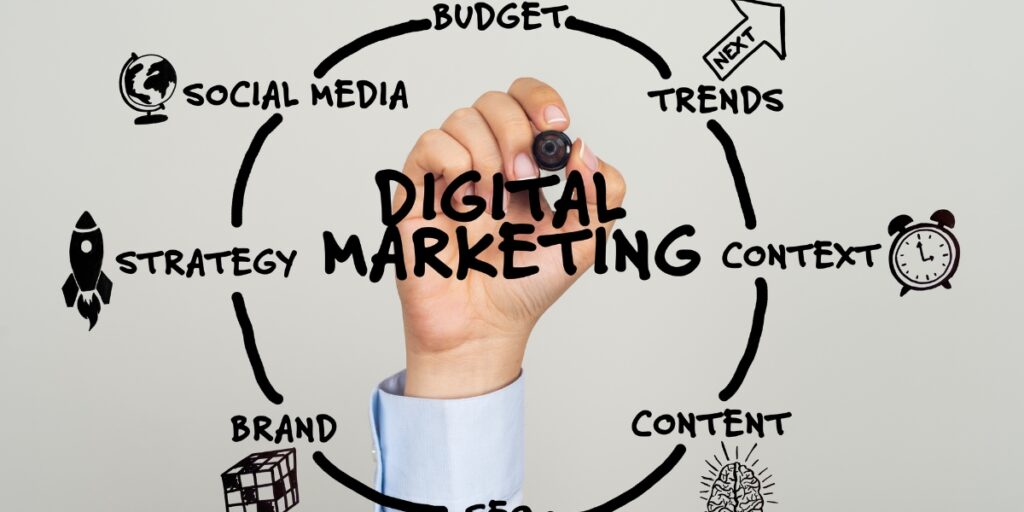
How can you make the most of digital marketing for your e-commerce platform? Here are some actionable insights:
SEO best practices for e-commerce
Optimize product descriptions, use high-quality images, and ensure quick website loading times to improve rankings.
Utilizing content marketing to its full potential
Craft compelling blog posts, infographics, and videos to engage users and drive traffic to your site.
Email marketing and its undying effectiveness
Segment your audience, personalize emails, and automate campaigns for maximum effectiveness.
Common Challenges in E-Commerce Digital Marketing
Every silver lining has a cloud. Here are some challenges you might face:
Keeping up with changing algorithms
Search engine algorithms are ever-evolving. It’s crucial to stay updated to maintain your website’s ranking.
Managing negative reviews and feedback
Address criticisms constructively. Transparently handle complaints to build trust among your customers.
Adapting to ever-evolving consumer expectations
Today’s consumers are informed and demanding. Regular market research can help you stay aligned with their needs.
Case Study: Success with Digital Solutions
Company X, once a small startup, now dominates the online shoe market. Their secret? A potent mix of SEO, influencer collaborations, and AI-driven personalized shopping experiences. This case underscores the power of innovative digital strategies in elevating an e-commerce platform.
Future of E-Commerce and Digital Marketing
The fusion of e-commerce and digital marketing is here to stay. With augmented reality shopping, voice search optimization, and sustainable practices becoming more prevalent, the future looks promising and dynamic.
FAQs on E-Commerce and Digital Marketing Solutions

Q: What is the most effective digital marketing strategy for e-commerce?
A: It varies by business and target audience, but often a combination of SEO, content marketing, and personalized email campaigns yields the best results.
Q: How often should I update my e-commerce marketing strategies?
A: Regularly. With digital trends changing swiftly, a quarterly review is a good practice.
Q: Why is mobile optimization crucial for e-commerce?
A: A significant portion of consumers shop via mobile. Mobile optimization ensures you don’t miss out on this massive audience.
Q: Are traditional marketing strategies still effective for e-commerce?
A: While digital strategies are taking the lead, traditional methods can still be effective, especially when combined with digital efforts.
Q: How do I handle negative online reviews?
A: Address them professionally, show empathy, and make genuine efforts to rectify any issues raised.
Q: Is influencer marketing worth the investment for e-commerce?
A: Yes, if chosen wisely. Influencers can drastically increase brand visibility and drive targeted traffic to your site.
Concluding Thoughts on Elevating Your E-Commerce Game
To truly Elevate Your E-Commerce Game with Cutting-Edge Digital Marketing Solutions, businesses must remain adaptive, innovative, and customer-focused. The digital realm offers vast opportunities, and with the right strategies, any e-commerce platform can thrive.

